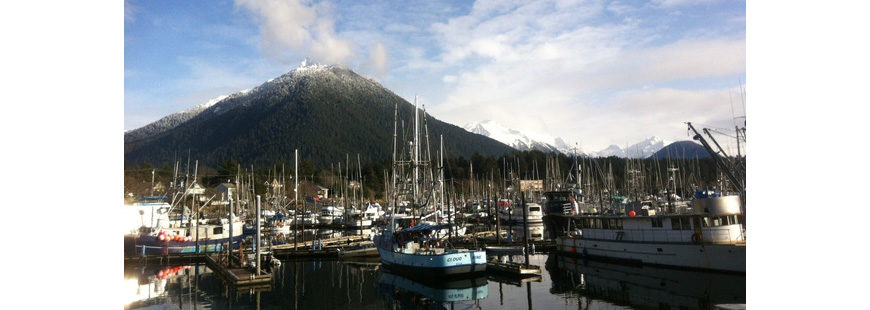By Linda Behnken and Kevin Scribner, MFCN Policy Council co-chairs
For the two of us, climate change is top of mind. It impacts the way we do business, the way we think about the ocean resources we depend on, the way we see our communities surviving into the future. We’re going to have to adapt; we’ve already had to adapt. Climate change is affecting every point on Earth, including Southeast Alaska and the Pacific Northwest, where we live and work. Warming water temperatures, ocean acidification, intensified storms, rising sea levels, ocean heat waves, salinity alterations, and slowing ocean currents are some of the climate change impacts occurring off shores around the globe.
Each of these factors have profoundly impacted the habitats that support the resources we depend on, throughout the marine ecosystem. And small-scale, community-based fishermen are often disproportionally exposed to climate change impacts because we are place-based. To restore ocean health and ensure our seafood businesses will be able to persist, resource governance in the ocean is going to have to operate in new, adaptive, resilience-focused ways.
The time is now to take action.
The Magnuson-Stevens Fishery Conservation and Management Act (MSA) was passed in 1976, when climate change wasn’t even a buzzword, let alone an acknowledged generational threat. In fact, the MSA does not contain specific provisions to account for or address climate change in fisheries management. Updating the law to include criteria for incorporating climate change data into scientific assessments, and a methodology for doing so, will create a more complete picture of the environmental conditions affecting ocean fisheries.
We know that natural disasters like hurricanes, ocean heat waves, and harmful algal blooms occur more frequently and with greater intensity. In some regions, destabilized seasons are the norm rather than the exception. Fisheries managers must be given the tools and mandates to plan for these uncontrollable events when adopting management measures, such as annual catch limits, season dates, or other management provisions, including emergency actions that adjust existing measures during the fishing season in response to unpredicted environmental events.
Small scale fishermen have long been advocates for ocean health. We are storytellers for the ocean because our stories and our communities’ stories depend on a healthy ocean. Mechanisms must also be developed that will provide coastal communities and fishery-dependent businesses the means to better predict, and recover from, economic losses attributable to climate-related environmental changes and acute and unanticipated environmental events. Folding support for communities and the critical working waterfront into fisheries management is critical if small-scale fisheries are going to survive. Likewise, sustaining small scale fisheries is critical if coastal communities and the ocean resources they champion are to thrive.
Adapting fisheries management to climate change is no longer optional; it is inevitable. We need a proactive management approach that can quickly adapt to the reality of our changing oceans and fisheries. The Magnuson-Stevens Act should be amended to provide guidance to the Secretary of Commerce, NOAA, and the eight regional fishery management councils for adapting conservation and management measures to unpredictable and evolving ocean conditions and ensuring fisheries management decisions support the health and abundance of fish stocks. The law should also provide a mechanism that allows fishery managers to quickly implement regulations or interim measures to prevent overfishing and increase the resiliency of fish stocks and fishing communities in the face of environmental emergencies, including those attributed to climate change.
The two of us have worked hard over the past year with our colleagues at the Marine Fish Conservation Network to create and advance some targeted legislative actions that could bring these important new policies to bear. Specifically, we are urging Congress to undertake the following actions:
- Fishery management plan requirements should be amended to include a determination of the impacts of climate change on the fishery and establish conservation and management measures to respond to those impacts. Fishery management plans should establish criteria for determining when an emergency attributable to climate change is affecting the fishery or fishing community, such as rapid declines in fish populations, sudden changes in fish distribution, or changes in environmental conditions that could affect fish stocks or fish habitat.
- The Secretary of Commerce should have the ability to enact emergency regulations or interim measures during a fishing season or fishery management cycle to prevent or reduce overfishing and promote resilience of fish stocks during climate change emergencies. Under such a framework, relevant regional fishery management councils would be consulted prior to setting regulations or interim measures; any measures taken should not exceed the annual catch limit for the fishery and should maximize fishing community participation in the decision-making process and the access of fishing communities to available harvest.
- All stock assessments should include known impacts of climate change on the fishery and assess the stock’s vulnerability to these changing conditions. Stock assessments should also offer recommendations for addressing climate change impacts on the fishery and identify any additional research needed to better understand the impacts.
- A process should be established that, at the request of a fishery management council, allows the Secretary of Commerce to determine if a fishery extends beyond the jurisdiction of the council currently managing it and, in coordination with the relevant councils, determine the best council or councils to prepare a new or joint fishery management plan.
These improvements are sure to make a difference. For the sake of the long-term health and productivity of U.S. fisheries and fishing communities, we cannot afford to fail.
About the Authors:
Linda Behnken, a commercial fisherman, is Executive Director of the Alaska Longline Fishermen’s Association. Kevin Scribner, a former fisherman, is the founder of Forever Wild Seafood and serves on the Slow Food USA Food and Farm Policy Committee. They serve as co-chairs of the Marine Fish Conservation Network’s Policy Council


